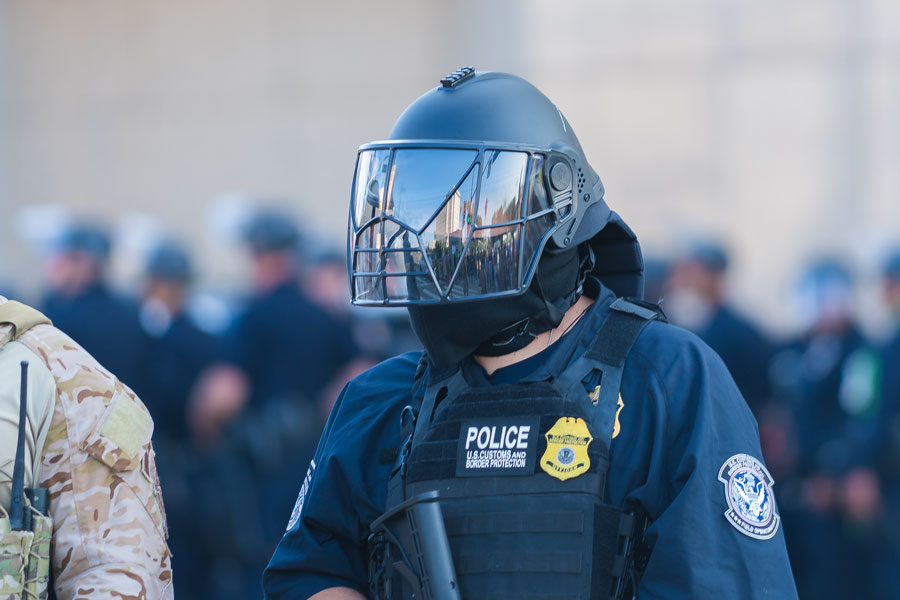
BOSTON, MA – Federal immigration authorities have launched a new enforcement operation in Massachusetts, escalating tensions between Washington and local officials who oppose the effort.
The initiative, known as Operation Patriot 2.0, began in early September and is described by the Department of Homeland Security as a targeted campaign against undocumented immigrants with criminal records. The operation follows a similar sweep in May that led to roughly 1,500 arrests statewide, including several high-profile cases on Martha’s Vineyard.
According to federal officials, the latest action focuses on individuals accused of violent crimes, gang activity, sexual offenses, and drug trafficking. ICE says the effort is necessary because local authorities, particularly in Boston, have declined to honor federal detainer requests – a stance rooted in the city’s sanctuary policies.
The crackdown arrives just days after the Department of Justice filed suit against the City of Boston, Mayor Michelle Wu, and the Boston Police Department, alleging that the city’s Trust Act unlawfully shields people from federal enforcement. The lawsuit marks one of the most direct legal challenges yet to local sanctuary ordinances under the Trump administration’s expanded immigration policies.
Local Leaders Push Back
Governor Maura Healey denounced the federal operation, calling it “political theater” that undermines community safety. Mayor Wu went further, labeling it an “unconstitutional attack” and pointing to Boston’s record as one of the safest large cities in the country.
City officials argue that cooperation with ICE undermines trust in law enforcement, discouraging immigrant communities from reporting crimes or cooperating in investigations.
Broader National Strategy
The crackdown in Massachusetts is part of a wider federal strategy targeting so-called sanctuary jurisdictions. Under Executive Order 14159, issued in January, the administration expanded enforcement tools to pressure local governments into compliance.
Civil rights groups have already pledged to fight the operation in court, while immigration attorneys across the state are bracing for a new wave of cases.
Key Points Snapshot
- Operation Name: Patriot 2.0
- Launched: Early September 2025
- Predecessor: Operation Patriot (May 2025, ~1,500 arrests)
- Federal Focus: Undocumented immigrants with criminal records, detainer non-compliance
- Local Response: Strong opposition from Governor Healey and Mayor Wu
- Legal Context: DOJ lawsuit filed Sept. 4, 2025 against Boston’s sanctuary policies
What Could Happen to Sanctuary Cities
The legal showdown between Washington and sanctuary cities like Boston raises pressing questions about what consequences local leaders might face. While federal officials argue that sanctuary laws obstruct enforcement, courts have historically recognized limits on how much the federal government can compel states or cities to act.
The primary repercussions under discussion are not the arrests of mayors or city officials, but rather financial and legal penalties. The Justice Department’s current lawsuit seeks to invalidate Boston’s Trust Act and potentially strip the city of certain federal funds. Other proposals under review in Congress could also tie law enforcement or public safety grants to compliance with immigration detainers.
Legal experts say the administration’s strategy is to use lawsuits and funding threats as leverage, rather than criminal charges against local officials. Courts will ultimately decide whether sanctuary policies conflict with federal law. Until then, sanctuary cities are expected to resist, framing their position as one of public safety and constitutional rights.
The Strategy Behind Federal Enforcement
From the administration’s perspective, the goal is twofold:
- Reassert Federal Authority: By pursuing lawsuits and high-profile enforcement operations, Washington aims to establish that immigration law is a federal responsibility and cannot be selectively disregarded by local jurisdictions.
- Deterrence and Pressure: Operations like Patriot 2.0 are not only about arrests but also about sending a message – to discourage sanctuary policies nationwide and compel cooperation through legal and political pressure.
For residents, this means that while mayors are unlikely to face personal arrest, cities that maintain sanctuary laws could see increased federal raids, lawsuits, and the potential loss of funding streams. The outcome of the Boston case is likely to set an important precedent for how this standoff plays out across the country.
What Sanctuary Cities Can Do
- Limit Local Cooperation: Cities can pass laws or policies (like Boston’s Trust Act) that restrict local police from asking about immigration status, holding people beyond their release date for ICE, or sharing certain information unless required by law.
- Set Enforcement Priorities: Local governments can direct resources toward community policing and away from immigration enforcement, arguing that federal immigration law is not their responsibility.
- Challenge in Court: Cities often sue the federal government, arguing that mandates to enforce immigration law violate the Constitution’s “anti-commandeering” principle, which bars Washington from forcing state or local agencies to carry out federal programs.
What Sanctuary Cities Cannot Do
- Block Federal Officers: Cities cannot legally prevent ICE or Border Patrol from operating within their boundaries. Federal agents have authority under federal law to make arrests and conduct operations anywhere in the United States.
- Physically Interfere: If local officials were to actively obstruct or interfere with federal enforcement, that could expose them to legal consequences, including obstruction charges.
The Balance in Practice
So while sanctuary cities can withhold their own resources and limit cooperation, they cannot stop federal officers from conducting raids, arrests, or investigations inside their jurisdictions. The standoff is therefore mostly about non-cooperation versus federal pressure – with the main battles fought in court and over funding, not on the streets.


